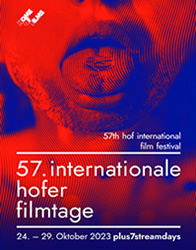A virtue of necessity
The term “Double Feature” – which usually means that you can watch two films in a double program for the price of one ticket – was redefined in Hof in 2020: The 54th Hof International Film Festival took place as a Double Feature Festival. For the first time at a festival in Germany, all films (71 feature films and 54 short films) were presented twice. They were not only shown in the cinemas in Hof, but could also be viewed online throughout Germany under “HoF on Demand”. The online program was even available for 13 days, a week beyond the six-day physical festival. The reason for this novelty, like so many other things in this crazy year, was the Corona pandemic, which since March has severely restricted cultural events. So, the HoF festival team offered a dual festival as a result. In addition to films, discussions and talk rounds were also streamed. Each day, the festival produced almost six hours of its own content and, as the first festival ever, its own late-night talk show, GastHoF, with interactive audience participation and many interesting guests.
“The point was to celebrate cinema and send a signal to the industry: We are still here!”
Admittedly, after 30,000 visitors in the previous year, this time only 4,700 came to the cinemas, which could only sparsely be filled. But the fans who had to stay at home this year streamed the festival films more than 17,000 times! The program, which started with AND TOMORROW THE ENTIRE WORLD – in which director Julia von Heinz deals with her own political involvement in her youth – was quite something. Films from many countries, from Argentina to India and from Mexico to Iraq, dealt with current, often explosive topics; one of the surprises, FORCE OF HABIT, came from Finland and dealt with the MeToo movement in a clever, bold and even funny way. In addition to political films, there was also “weird cinema,” such as the Icelandic vampire film THIRST by the directing duo Gaukur Ulfasson and Steinbor Hroar, and a focus on strong families and strong desires. And there was a special on the theme of “Leaving home … coming home” with three films by the Austrian “radical” artist Ludwig Wüst.
As always, the focus was on German cinema, which impressed, among others, with the scary dystopia END-80 by Willi Kubica, the cheeky chamber play BABY BITCHKA by Anna Maria Roznowska and the documentary AWARE – GLIMPSES OF CONSCIOUSNESS by Eric Black and Frauke Sandig. Prizes were awarded to RIVAL by Marcus Lenz (German Cinema Talent Award) and TOPRAK by Sevgi Hirschhäuser (Hof Gold Prize).
As the saying goes, you can get used to just about everything. To a certain extent, this even applies to film festivals under pandemic conditions. In any case, the Hof International Film Festival, which was able to fall back on a tried and tested concept from the previous year, mastered all problems in its 55th edition. Once again, most of the 67 features and 51 short films could be screened both in theaters and, under “HoF on Demand,” online.
There was even a documentary about life with Corona. It was called ISOLATION and included five episodes by European filmmakers, among them the only woman, the German Julia von Heinz, who took home the city’s film prize from the 2021 festival; her friend and mentor Rosa von Praunheim gave the laudatory speech.
“An intense film festival that should not be a bit quiet…”
…promised artistic director Thorsten Schaumann. They were also funny: The opening film THE BLACK SQUARE by Peter Meister proved to be so funny and rousing that it was awarded the German Cinema New Talent Award. The Hof Gold Prize for Best Feature Film Debut was awarded by Philip Gröning to Alisa Kolosova for CHARLY and Lukas Röder for BRAIN TATTOO. The extensive HoF-PLUS program also included numerous talks, discussions and a so-called Master Class with the American director Abel Ferrara, who presented the German premiere of his new film ZEROS AND ONES.
The number of admissions in the cinemas was twice as large as in the previous year, with a similar increase in the number of professional visitors, more than 650 came this time. Among the films, there was a lot to discover in all departments – feature film, documentary and short film – for example PASSION SIMPLE from France based on a book by Annie Ernaux, the surreal women’s film TRÜMMERMÄDCHEN by Oliver Kracht, the moving refugee report THE GAME: GAMBLING BETWEEN LIFE AND DEATH by Manuela Federl or David Preute’s banker thriller ROGUE TRADER.
“The HoF Classics from the 1980s and the homage to actor Joachim Król, which included eight feature films and the story of the soccer anthem YOU’LL NEVER WALK ALONE also left a strong impression.”
Król, a self-confessed soccer fan and long-time member of the FC Hofer Filmtage team, was content this time to kick off the traditional match against FC Filmwelt. The festival was enriched this year by a guest appearance of the Insel-Kino association from Rodewisch in the Vogtland region, which stationed its cinema bus in the old town and screened short films from the festival program for four days. Normally, the bus travels to areas where the nearest cinema is far away.


